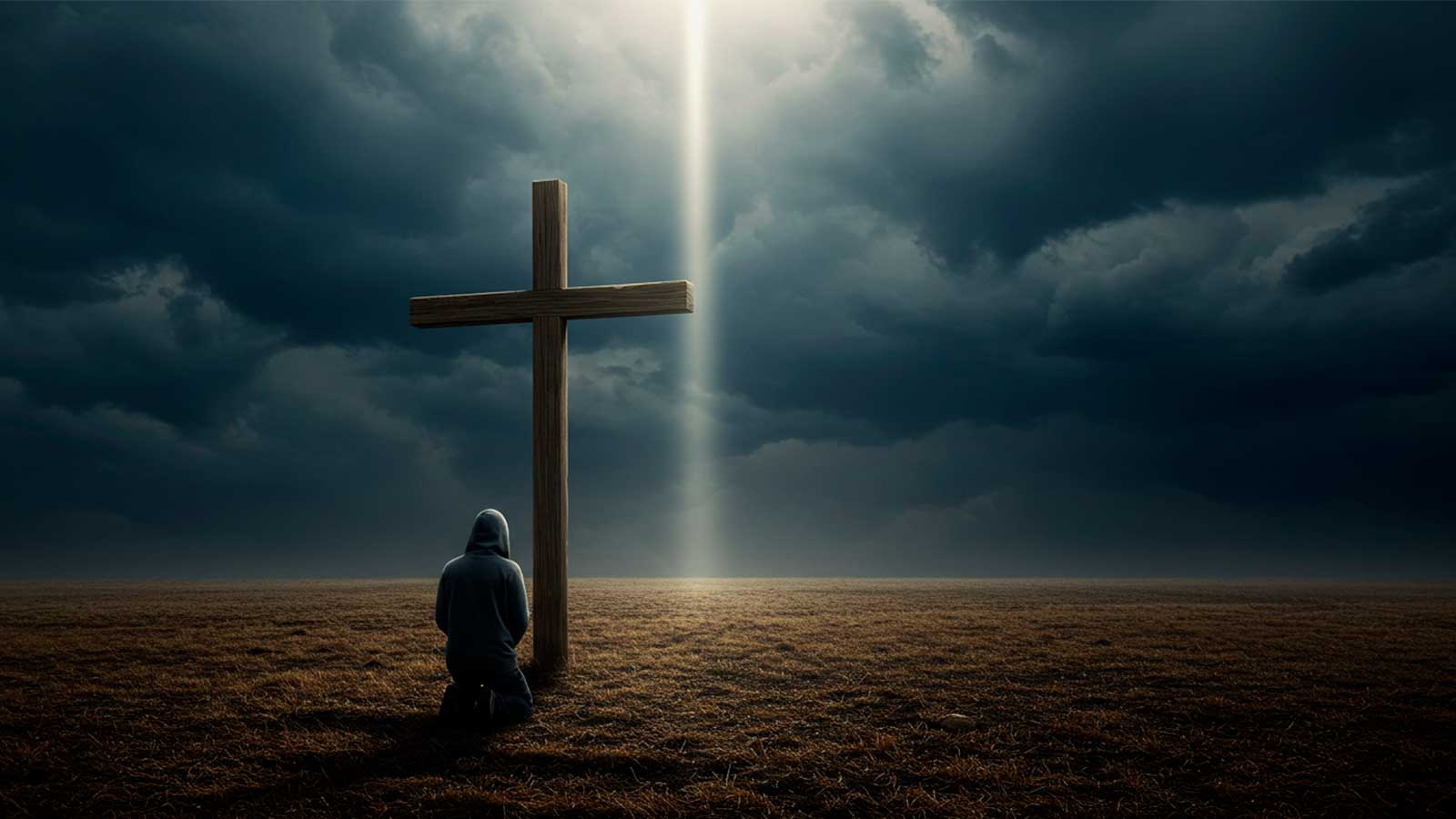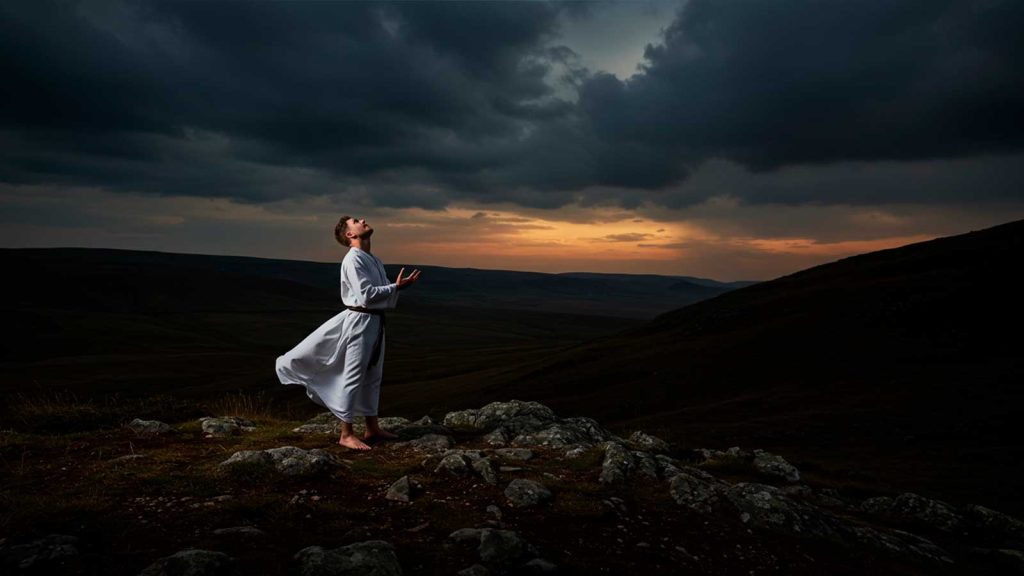The Psalm 22 is one of the most intense and moving passages in the Book of Psalms. It begins with a cry of abandonment, but ends with a powerful declaration of trust.
In this article, we will dive deep into the depths of this psalm, understanding its historical context, symbolism, spiritual interpretations, and how it connects with the human experience of pain, faith, and redemption.
Complete Psalm 22
¹ My God, my God, why have you forsaken me? Why are you so far from my help and from the words of my groaning?
² My God, I cry by day, but you do not answer; and by night, but find no rest.
³ Yet you are holy, enthroned on the praises of Israel.
⁴ In you our fathers trusted; they trusted, and you delivered them.
⁵ To you they cried out, and were delivered; in you they trusted and were not put to shame.
⁶ But I am a worm and not a man, scorned by everyone, despised by the people.
⁷ All who see me mock me; they make mouths at me; they shake their heads, saying:
⁸ “He trusted in the Lord; let him deliver him, since he delights in him.”
⁹ Yet you are the one who took me out of the womb; you made me trust even at my mother’s breasts.
¹⁰ From birth I was cast upon you; from my mother’s womb you have been my God.
¹¹ Do not be far from me, for trouble is near, and there is none to help.
¹² Many bulls encompass me; strong bulls of Bashan have surrounded me.
¹³ They have opened wide their mouths against me, like a lion that tears and roars.
¹⁴ I am poured out like water, and all my bones are out of joint; my heart is like wax—it has melted within me.
¹⁵ My strength is dried up like a potter’s vessel, and my tongue sticks to my jaws; you have set me in the dust of death.
¹⁶ For dogs have surrounded me; a company of evildoers has enclosed me, piercing my hands and my feet.
¹⁷ I can count all my bones—they look and stare at me.
¹⁸ They divide my garments among themselves and cast lots for my clothing.
¹⁹ But you, O Lord, do not be far off! O my strength, hurry to help me!
²⁰ Deliver my soul from the sword, my precious life from the power of the dog.
²¹ Save me from the mouth of the lion; yes, hear me from the horns of the wild ox.
²² I will tell your name to my brothers; in the midst of the congregation I will praise you.
²³ You who fear the Lord, praise him; all you offspring of Jacob, glorify him, and fear him, all you offspring of Israel.
²⁴ For he has not despised or abhorred the affliction of the afflicted, nor has he concealed his face from him; but when he cried to him, he heard.
²⁵ My praise shall be of you in the great congregation; I will pay my vows before those who fear him.
²⁶ The meek shall eat and be satisfied; those who seek the Lord will praise him; your heart will live forever.
²⁷ All the ends of the earth shall remember and turn to the Lord, and all the families of the nations shall worship before your face.
²⁸ For the kingdom is the Lord’s, and he rules over the nations.
²⁹ All who are fat on the earth will eat and worship, and all who go down to the dust shall bow before him; and no one can keep alive his own soul.
³⁰ A posterity will serve him; it shall be declared to the Lord to every generation.
³¹ They will come and announce his righteousness to a people yet to be born, for he has done it.
Verse-by-Verse Explanation – Psalm 22
Verse 1
“My God, my God, why have you forsaken me? Why are you so far from my help and from the words of my groaning?”
The psalmist begins with a cry of despair, feeling abandoned by God at a critical moment. This is the very phrase that Jesus quotes on the cross (Matthew 27:46), directly connecting to human pain and the apparent divine silence.
Verse 2
“My God, I cry by day, but you do not answer; and by night, but find no rest.”
The pain is constant. There is a plea for help both by day and by night, yet the feeling is of no response. The soul is restless.
Verse 3
“Yet you are holy, enthroned on the praises of Israel.”
Even in suffering, there is recognition of God’s holiness. The psalmist does not doubt the divine character; he only expresses his anguish.
Verse 4
“In you our fathers trusted; they trusted, and you delivered them.”
He recalls God’s faithfulness with previous generations. This strengthens his faith even amidst pain.
Verse 5
“To you they cried out, and were delivered; in you they trusted and were not put to shame.”
The psalmist affirms that those who trusted in God were not shamed. This shows an expectation that the same divine faithfulness will manifest again.
Verse 6
“But I am a worm and not a man, scorned by everyone, despised by the people.”
Here, he expresses extreme humiliation. He feels inferior, insignificant, rejected, and treated with disdain.
Verse 7
“All who see me mock me; they make mouths at me; they shake their heads, saying:”
The suffering intensifies with public ridicule. There is scorn and derision from those who watch him.
Verse 8
“He trusted in the Lord; let him deliver him, since he delights in him.”
The mockers ironize his faith, daring God to save him. This scene is echoed in the accounts of the crucifixion of Jesus.
Verse 9
“Yet you are the one who took me out of the womb; you made me trust even at my mother’s breasts.”
The psalmist acknowledges that his life has always been in God’s hands, from birth. His faith was nurtured from the very beginning.
Verse 10
“From birth I was cast upon you; from my mother’s womb you have been my God.”
This reinforces the intimate and ancient relationship with God. Trust did not arise from suffering, but from the very start of life.
Verse 11
“Do not be far from me, for trouble is near, and there is none to help.”
He implores for the divine presence, for the anguish is near and no human help is sufficient.
Verse 12
“Many bulls encompass me; strong bulls of Bashan have surrounded me.”
The “bulls of Bashan” symbolize powerful enemies and oppressors. The threat is intense and imposing.
Verse 13
“They have opened wide their mouths against me, like a lion that tears and roars.”
The psalmist feels attacked with ferocity. His enemies are like lions ready to destroy.
Verse 14
“I am poured out like water, and all my bones are out of joint; my heart is like wax—it has melted within me.”
Here, he describes the physical and emotional exhaustion. The body is weak and the heart is shattered.
Verse 15
“My strength is dried up like a potter’s vessel, and my tongue sticks to my jaws; you have set me in the dust of death.”
Life is fading away. There is dryness, thirst, and a feeling that death is imminent.
Verse 16
“For dogs have surrounded me; a company of evildoers has enclosed me, piercing my hands and my feet.”
A direct image of violence and injustice. The expression “piercing my hands and my feet” is seen by many as a prophetic reference to the crucifixion.
Verse 17
“I can count all my bones—they look and stare at me.”
The pain is so deep that the bones seem visible. The suffering is observed by others, without empathy.
Verse 18
“They divide my garments among themselves and cast lots for my clothing.”
Another passage directly connected to the crucifixion. The humiliation is complete; even his garments are taken away.
Verse 19
“But you, O Lord, do not be far off! O my strength, hurry to help me!”
Even in the face of death, the psalmist cries for help. God remains his only hope.
Verse 20
“Deliver my soul from the sword, my precious life from the power of the dog.”
He pleads for the preservation of his life, asking deliverance from fierce and cruel enemies.
Verse 21
“Save me from the mouth of the lion; yes, hear me from the horns of the wild ox.”
The psalmist acknowledges that God has begun to answer. The turning point begins: from plea to salvation.
Verse 22
“I will tell your name to my brothers; in the midst of the congregation I will praise you.”
A promise of public testimony. He will praise God before all, in gratitude for the salvation.
Verse 23
“You who fear the Lord, praise him; all you offspring of Jacob, glorify him, and fear him, all you offspring of Israel.”
An invitation to worship. The psalmist exhorts all the people to praise God.
Verse 24
“For he has not despised or abhorred the affliction of the afflicted, nor has he concealed his face from him; but when he cried to him, he heard.”
It affirms that God does not ignore suffering. He hears the afflicted and responds with mercy.
Verse 25
“My praise shall be of you in the great congregation; I will pay my vows before those who fear him.”
He reinforces his commitment to worship publicly and fulfill the promises made to God.
Verse 26
“The meek shall eat and be satisfied; those who seek the Lord will praise him; your heart will live forever.”
There is a blessing for the humble and the seekers. They will be nourished and live with lasting joy.
Verse 27
“All the ends of the earth shall remember and turn to the Lord, and all the families of the nations shall worship before your face.”
The psalmist looks to the future. Salvation extends to the nations—a prophetic announcement of global worship.
Verse 28
“For the kingdom is the Lord’s, and he rules over the nations.”
This affirms God’s sovereignty over all the earth. He is the absolute King.
Verse 29
“All who are fat on the earth will eat and worship, and all who go down to the dust shall bow before him; and no one can keep alive his own soul.”
Rich and poor, living and dead: all are subject to God. Worship is universal.
Verse 30
“A posterity will serve him; it shall be declared to the Lord to every generation.”
A lineage of the faithful will continue to serve God. The praise will be passed on from generation to generation.
Verse 31
“They will come and announce his righteousness to a people yet to be born, for he has done it.”
Future generations will know of God’s righteousness. What God has done will be proclaimed eternally.

Context of Psalm 22
Psalm 22 is traditionally attributed to King David. It expresses a moment of deep suffering, yet at the same time an unwavering faith in the salvation that comes from God. Its dramatic beginning — “My God, my God, why have you forsaken me?” — became famous for being quoted by Jesus on the cross, according to the gospel accounts.
The Connection with the Crucifixion
Many scholars see in Psalm 22 a prophetic prefiguration of the sufferings of Christ. Elements such as “piercing my hands and my feet” and “they divide my garments among themselves” are frequently associated with the crucifixion. This makes the psalm a link between the Old and the New Testament.
Poetic and Literary Structure
The text alternates between intense lament and declarations of trust. This creates an emotional progression from darkness to light, from pain to hope. The structure of Psalm 22 is carefully built to lead the reader on a journey of inner transformation.

Meanings and Messages of Psalm 22
The Apparent Abandonment
The psalmist’s pain is real and visceral. The feeling that God is distant reflects universal human experiences. Psalm 22 shows that it is legitimate to cry out, question, and even lament before God, without that meaning a loss of faith.
The Remembrance of the Past
Throughout the verses, the psalmist recalls God’s deeds in the past. This serves as an anchor for his faith. He acknowledges that even though the present is painful, the Lord has always acted with faithfulness.
The Certainty of the Response
Even amidst suffering, the author of Psalm 22 declares that God will hear him. This brings forth a powerful message: pain is not the end of the story. There is a promise of deliverance, and faith sustains until that deliverance comes.
Symbolisms in Psalm 22
Psalm 22 is full of symbolic images that express anguish and redemption. Let’s analyze some of these representations:
Animals as Metaphors for Suffering
The psalmist mentions bulls of Bashan, dogs, lions, and other wild animals. They symbolize oppressive forces, merciless enemies, and dangers surrounding the afflicted soul. The language intensifies the drama and brings the reader closer to the described experience.
The Torn-apart Body
References to a weakened body, exposed bones, and pierced hands amplify the described suffering. More than physical pain, these images represent vulnerability and the total exposure of the soul before God.
The Divided Garment
Another powerful symbol in Psalm 22 is the divided garment. Besides alluding to the passion of Christ, this detail shows how suffering can be accompanied by humiliation and the loss of dignity.
Spiritual Interpretations of Psalm 22
A Messianic Psalm
Many view Psalm 22 as one of the clearest messianic psalms. The similarities with the crucifixion of Jesus are striking, and the Christian tradition often uses this text in Holy Week liturgies.
An Expression of Authentic Faith
Beyond its messianic theology, Psalm 22 is a faithful portrayal of the human soul in suffering. It teaches that true faith does not ignore pain, but goes through it with hope.
Personal Applications
Who hasn’t felt abandoned, without answers, surrounded by challenges that seem greater than one’s own strength? Psalm 22 teaches us that we can bring these feelings directly to God, with trust.
Curiosities about Psalm 22
- It is one of the most quoted psalms in the New Testament.
- It was probably chanted during solemn moments of national anguish.
- In some traditions, it is read during the Good Friday liturgy.
- Its tone of lament contrasts with Psalm 23, which follows immediately and brings comfort and peace.
- Some ancient manuscripts use different words to reinforce the described suffering.
Practical Applications of Psalm 22 in Daily Life
For Those Who Are Suffering
Psalm 22 can be an prayer for those who feel alone or forsaken. It shows that God hears even when silence seems to prevail.
To Strengthen Faith
Reading and meditating on this psalm helps to develop a more mature faith. It teaches that trusting in God does not depend on circumstances, but on the certainty of who God is.
For Moments of Intercession
The psalmist’s cry can inspire intercessory prayers for others going through trials. It is a way to bring comfort and solidarity through the Word.
Psalm 22 and the Hope of Restoration
The end of Psalm 22 points to restoration. It anticipates a time of praise, communion, and testimony. The one who suffered will be vindicated. This conclusion reminds us that pain may last for one night, but joy comes in the morning.

FAQ about Psalm 22
Was Psalm 22 really written by David?
Yes, both the Jewish and Christian traditions attribute its authorship to David.
Why is Psalm 22 so important to Christians?
Because many verses anticipate events from the crucifixion of Christ.
Is it appropriate to use Psalm 22 in moments of despair?
Yes. It was written precisely as a legitimate expression of suffering and faith.
What is the main message of Psalm 22?
Pain is not the end. God hears, responds, and transforms suffering into testimony.
Conclusion
Psalm 22 is one of the most impactful texts in the Bible. It unites pain and faith in an authentic way, revealing the heart of someone who, even feeling abandoned, continues to trust in God. In studying it, we are invited not to hide our pain, but to present it before the Creator with confidence. It is a psalm that speaks of today, yet points to eternity — where every tear will be wiped away and every cry will be answered.
READ ALSO:
- Psalm 21: Victory, Trust, and Gratitude to the Most High God
- Psalm 20: The Prayer That Strengthens in Times of Battle
- Psalm 19: The Harmony Between Nature and the Divine Word
FOLLOW US ON FACEBOOK
FOLLOW US ON PINTEREST